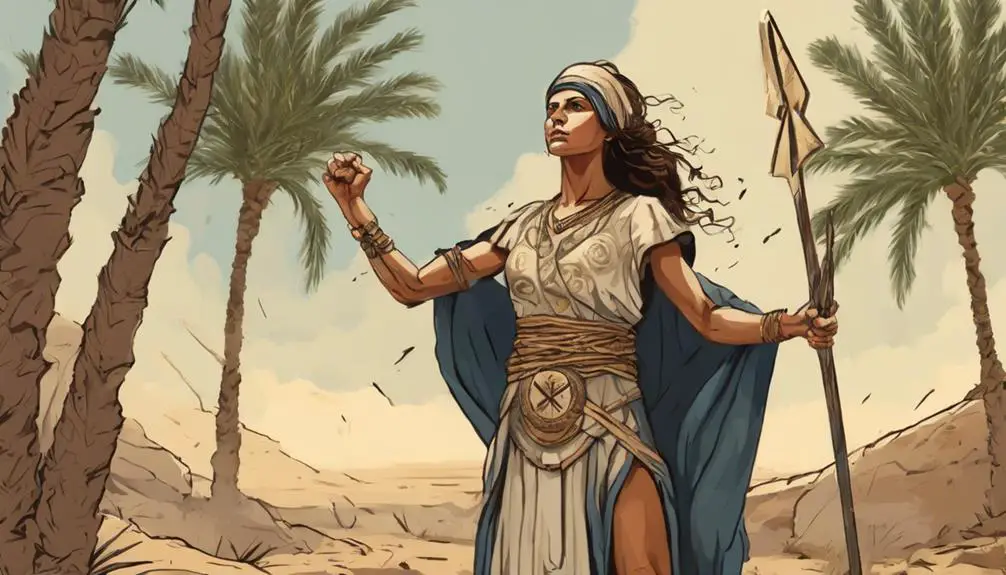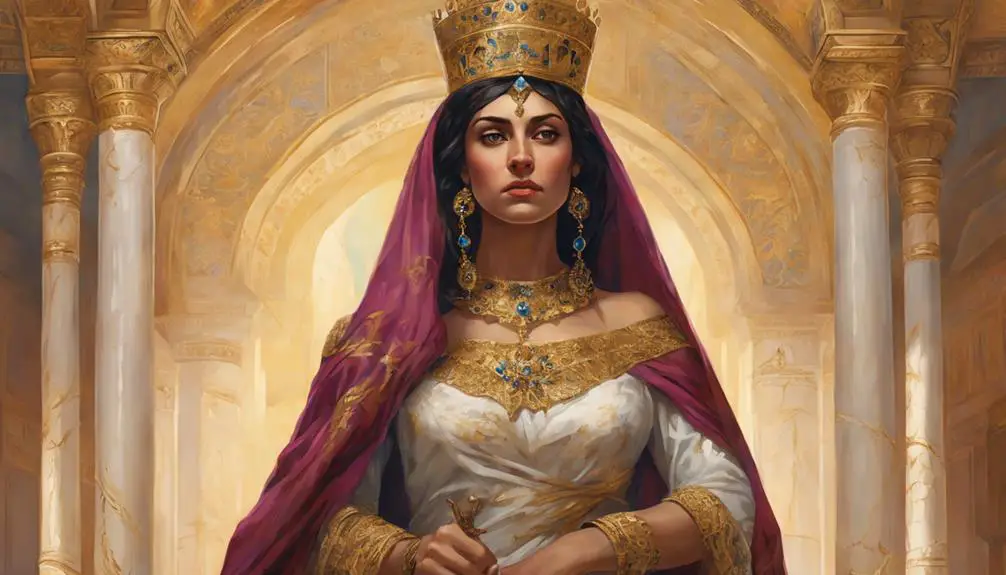Uncover the untold stories of warrior women in the Bible and their profound impact on biblical history.

Warrior Women in the Bible
Just as a diamond stands out amongst pebbles, certain women in the Bible shine with a warrior spirit. You might be familiar with characters like Deborah, the prophetic warrior, or Esther, the queen of courage.
Yet, there's more to their stories, more to their battles and victories, that often go unnoticed. So, wouldn't you be intrigued to explore these unsung heroines' tales further, their strength, their resilience, and the impact they've had on biblical history?
Key Takeaways
- Deborah and Jael are celebrated biblical figures known for their leadership and bravery in leading Israel to victory.
- Queen Esther epitomizes courage, demonstrating how fearless action can lead to the salvation of a nation.
- Judith's audacious act of bravery and quick thinking made her a celebrated figure in biblical narratives.
- Mary, the spiritual warrior, showcases the power of faith, resilience, and unwavering relationship with God in facing trials.
Deborah: The Prophetic Warrior

Delving into the life of Deborah, you'll find a prophetic warrior whose leadership and strategic prowess led the Israelites to victory during the oppressive reign of Canaanite King Jabin. Her prophetic leadership wasn't the result of a power grab; instead, she was divinely chosen and obediently served in a role that was typically reserved for men.
Deborah's bravery was unmatched, demonstrating her courage by leading a military campaign against Jabin's forces, a feat unheard of for a woman in those times. This wasn't a mere act of desperation; it was a calculated strategy born of divine insight and an unwavering belief in God's promise of deliverance.
Her leadership style was also unique. While many leaders of the era were authoritarian, Deborah led with a sense of collaboration and mutual respect. She didn't shy away from making tough decisions, but she also valued the input and contributions of others. This approach built trust among her followers and fostered a sense of unity that was instrumental in their victory.
In analyzing Deborah's life, you can't help but admire her prophetic leadership and bravery. She's a prime example of a fearless leader who used her divine gifts for the good of her people.
Jael: The Tent Peg Heroine

Switching focus to another warrior woman, Jael, we encounter a heroine whose cunning and courage radically shifted the course of a battle. The story of Jael, the wife of Heber the Kenite, is told in Judges 4 and 5. Your appreciation for Jael's bravery could be enhanced if you delve into the specifics of the story.
When Sisera, the commander of Canaanite King Jabin's army, fled from the Israelites and sought refuge in her tent, Jael welcomed him. She provided him with milk when he asked for water, lulling him into a false sense of security. But her real intentions were far from hospitable.
Jael's tent peg tactics are a testament to her quick thinking and bravery. Once Sisera was asleep, she took a tent peg and a hammer, and, with a steady hand and a steadfast heart, she drove the peg through his temple, killing him instantly. This act of courage not only ended Sisera's life but also the oppression of the Israelites by Jabin's forces.
Jael's bravery and cunning thus played a pivotal role in Israel's victory, marking her as one of the Bible's most notable warrior women.
Esther: Queen of Courage

Turning our attention to Esther, you'll find a queen whose courageous actions saved an entire nation from annihilation. Esther's influence extends beyond her era, shaping how we perceive courage and leadership in the face of adversity. As a Jewish woman who became Persian royalty, she was a minority in a court rife with intrigue and danger.
Let's delve into her courageous leadership. When she learned of a plot to eradicate the Jews, she didn't cower. Instead, she devised a plan to appeal to King Ahasuerus. This was a risky move; she could have been killed for approaching the king without an invitation. Yet, Esther's conviction and bravery overcame fear. She executed her plan with wisdom, hosting banquets to soften the king's heart before revealing the plot.
Through her actions, Esther demonstrated that courage isn't about being fearless, but about taking action despite fear. Her influence resonates today as she exemplifies that anyone, regardless of their status, can bring about change. Courageous leadership, as Esther showed, can even be the difference between life and death. Thus, we celebrate Esther as a true warrior woman of the Bible.
Judith: The Beheading Heroine

From the inspiring tale of Esther, we now move to another resolute figure, Judith, whose audacious act of beheading an enemy general highlights her as a unique heroine in biblical narratives. You'll see Judith's bravery as she embarks on a daring mission to save her people. Her audacious act, while grim, underscores the lengths to which she was willing to go.
Her strategy was as brilliant as it was bold. By using her beauty and wit, she gained the trust of Holofernes, the enemy general, before seizing the opportune moment to strike. It's in this act that the heroine's tactics shine through.
Judith's Bravery |
Heroine's Tactics |
Outcome |
|---|---|---|
Displayed when she volunteered for the risky mission. |
Used her beauty and wit to infiltrate the enemy camp. |
Saved her people from the impending attack. |
Courageous enough to approach the enemy general. |
Crafted a scenario to be alone with Holofernes. |
Beheaded the enemy general. |
Risked her life for her people. |
Displayed quick thinking and decisiveness. |
Triumphed over the enemy. |
Demonstrated in her faith in God. |
Her ability to adapt and improvise. |
Became a celebrated figure in biblical narratives. |
Avoid comparing Judith to Mary, our next spiritual warrior, as their battles were fought on different fronts.
Mary: The Spiritual Warrior

Often overlooked as a warrior, Mary, the mother of Jesus, fought her own spiritual battles with unwavering faith and quiet resilience, setting her apart as a formidable figure in biblical narratives. As a spiritual warrior, she faced insurmountable challenges with grace, and her journey exemplifies spiritual strength.
Mary's faithfulness was her primary weapon. She accepted Gabriel's daunting announcement with a humble 'Behold, the handmaid of the Lord' (Luke 1:38), reflecting her steadfast commitment to God's will. You witness her unwavering belief in God's plan, even when it involved watching her son crucified. This level of faithfulness isn't easily achieved, but it's an example of the profound spiritual strength she possessed.
Mary's life was marked by trials and tribulations, yet she maintained an extraordinary level of spiritual strength. Her courage and resilience in the face of adversity offer a blueprint for spiritual warfare. You can learn from Mary's faithfulness and spiritual strength, understanding that God's plan may involve hardship, but with unwavering faith, you too can conquer life's battles.
Mary, the Spiritual Warrior, is a testament to the power of faith and the strength that comes from a deep, unwavering relationship with God.
Frequently Asked Questions
Are There Any Other Warrior Women in the Bible Not Mentioned in These Sections?
Yes, there are. While not explicitly labeled as warriors, many women in the Bible demonstrate strong leadership and courage, which are warrior traits. Symbolic interpretations often highlight these characteristics.
For example, Esther's bravery in saving her people is commendable. Deborah, a prophetess and judge, also exemplifies female leadership, courageously leading Israel to victory.
It's crucial to delve deeper into these narratives to fully appreciate these warrior women.
How Do These Warrior Women Influence Contemporary Christian Beliefs and Practices?
In analyzing modern Christian beliefs, you'll find the warrior women's biblical representation significantly impacts perspectives. They've become symbols of strength, reshaping traditional gender roles.
Their influence feeds into modern feminism within the church, challenging patriarchal structures, and encouraging greater female leadership.
This shift in views is a testament to the enduring influence of these biblical figures, celebrating their contributions and redefining what it means to be a woman of faith today.
What Were the Societal Norms for Women During the Time of These Biblical Warrior Women?
In the Biblical era, societal norms for women were heavily influenced by gender expectations. You'd find women primarily in domestic roles, tasked with child-rearing, cooking, and maintaining the home. They weren't typically seen as warriors or leaders. Their roles were often subservient, with little room for deviation.
It's fascinating to dissect these norms, especially when you examine the anomalies that broke the mold in these historical narratives.
How Have Interpretations of These Warrior Women's Stories Evolved Over Time?
Over time, your understanding of these stories may have shifted, influenced by feminist interpretations and cultural representations. They've been reimagined, no longer just footnotes in a male-dominated narrative, but crucial characters in their own right.
As societal norms around gender evolve, you're seeing these figures not just as exceptions to the rule, but as indicators of the diverse roles women have always played.
The evolution of interpretation reflects changing cultural and societal norms.
Are There Any Controversies or Different Viewpoints Regarding the Actions and Roles of These Warrior Women in the Bible?
Yes, there are indeed controversies and varying viewpoints regarding the actions and roles of these figures. Gender interpretations often fuel these debates, with some questioning the traditional roles assigned to women.
Religious significance is another area of contention, as interpretations of these stories can impact theological perspectives.
It's a complex issue, requiring careful analysis and understanding of historical, cultural, and religious contexts.
Conclusion
So, you've journeyed through the tales of Deborah, Jael, Esther, Judith, and Mary. Each of these women, embodying courage and strength, challenged societal norms of their time. They weren't just side characters, they were pivotal in shaping biblical history.
Their stories serve as a testament to the power of women, and their roles as warriors, both in the physical and spiritual sense, continuing to inspire and empower women today.



Sign up